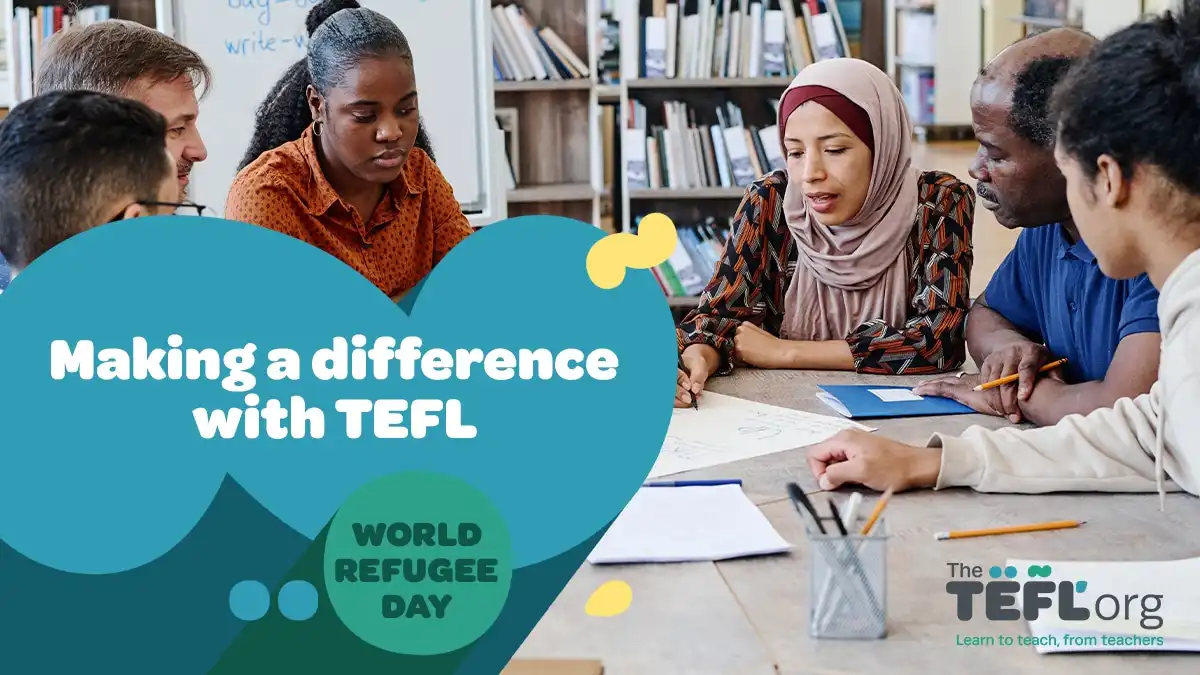- TEFL Courses
- New to TEFL New to TEFL
- Locations
- TEFL Jobs
- Teach Abroad Teach Abroad
- Teach English Abroad
- Teach English in Japan
- Teach English in South Korea
- Teach English in Spain
- Teach English in China
- TEFL Salaries Abroad
- Requirements for teaching abroad
- Teach English abroad without a degree
- How to find teaching jobs abroad without experience
- Can you teach English abroad as a non-native speaker?

- Teach Online
- About Us
- Blog
- Podcast

World Refugee Day: making a difference with TEFL
One of the biggest stories of recent years has been the plight of refugees and asylum seekers. Wars, natural disasters, despotic leadership, discrimination and other blights have caused a mass movement of people, the likes of which we haven’t seen since WW2. Humanitarian disasters in Ukraine, Afghanistan, Sudan, Palestine, Turkey and more have meant mass displacement of communities.
How does this have anything to do with TEFL? Actually, teaching English as a foreign language is one of the best responses you can have to the displacement of millions.
With many people finding safe haven in English-speaking countries, the opportunities to make a difference are obvious. Teaching English to refugees is one of the most vital and kind things you can do as a TEFL teacher.
World Refugee Day is celebrated every June 20th, and according to the UN, it “celebrates the strength and courage of people who have been forced to flee their home country to escape conflict or persecution”.
So, with that in mind, let’s have a look at how TEFL can help to build bridges and help refugees and asylum seekers to prosper.

Why TEFL can make the difference
Firstly, imagine this: you’re somewhere you never planned to be, you’ve fled unimaginable terror, and you can’t fluently speak the language of the country you’re in. Simply put, this is an anxiety that nobody should have to go through, but millions do .
Language is the biggest barrier to integration. Refugees and asylum seekers first have to face a barrage of paperwork, all in English, when they move to an English-speaking country. To assure their own safety and basic human rights, they need to know the language. Refugees, like anyone, just want to contribute and feel safe.
How can TEFL play a part in the first opportunity? By offering a welcome. Pamphlets and leaflets with basic guides to English phrases can truly make a world of difference, and help exponentially.
Signposting and even being a willing ear can make so much of a difference - the trauma that refugees experience is unbelievable - so basic communication and offering resources is a major help.
In towns and cities you can find ESOL classes run by volunteers. These are great for teachers - you can build experience, test lesson plans and gain confidence. They’re also great for community building, helping people to socialise and become more conversational.
For more qualified and experienced teachers, paid work can be found in colleges running ESOL classes for both young people and adults. Check out your local colleges for more information and job openings.
Language cafes and befriending schemes are also fantastic opportunities. Not only can refugees make friends and take part in conversational English lessons, but they can find valuable resources in their new communities.
How TEFL helps refugees
Teaching English can turn fear and misunderstanding into assimilation and opportunity. Refugees and asylum seekers need to know so many things about their new locality: how to enrol in schools, how to apply for housing, how to apply for asylum status, how to find legal representation, and so much more.
Typically, all of these activities are conducted in English - providing some translation help, teaching English at even a basic level and being a sympathetic ear means a whole lot.
By volunteering, you aren’t just teaching English skills, you’re making a life-changing impact. With charities stretched and local councils trying their best, but often falling short of what’s needed, newcomers to English-speaking countries can be left with a mountain of paperwork in a language they don’t understand.
Guiding them through that process, while teaching English, is a big job, sure. However, it’s one that will undoubtedly make someone’s life better.
And that’s just adults! Teaching English to young people on a voluntary level is also absolutely crucial and foundational. Whatever happens, kids who come from non-English speaking languages will immediately be at a disadvantage. Volunteering can make a world of difference.Teaching phrases, using games and building English skills means that kids can thrive at school, make friends and feel part of a community. It’s also a chance to build lasting relationships; people don’t forget those that helped them early in life.

How volunteering makes for great TEFL teachers
It works both ways, of course. Teaching refugees English is one of the best ways to gain experience as a TEFL teacher. Volunteer work looks amazing on a CV , and the fundamental, life-changing help you’re giving will definitely develop cornerstone skills that you need to excel as a TEFL teacher.
The empathy and patience you’ll need to show as a TEFL volunteer will give you immense perspective and vital emotional intelligence that all great TEFL teachers have. The ability to build core skills, adapt lesson plans for different needs and proficiencies, and of course, developing the skills to work with different age groups will set you on a rewarding path.
Nothing will test an ESL teacher - whether new or experienced - quite like working with refugees. It’s more than just language, it’s everything.
At The TEFL Org, we strongly believe in the value of volunteering and using English teaching to make a difference in the community. Whether it’s online or in-person, teaching English can be the difference between people struggling to get by, or thriving.You can alter the perception people have about an area, and turn fear and trauma into being part of a kind, outward-looking community. It really is that important and that valuable.
Resources and Organisations
Looking to get involved? Here are some of our favourite organisations and resources to help you into the rewarding world of volunteering with refugees
Organisations working with refugees in the UK
The Joint Council for the Welfare of I m migrants
Organisations working with refugees in the US
ORAM (Organization for Refuge, Asylum and Migration)
World Relief Western Washington
Organisations working with refugees in Ireland
Welcome English Language Centre
Organisations working with refugees in Canada
Organisations working with refugees in Australia
TAFE NSW Volunteer Tutor Program
The Smith Family Home Tutor Scheme
Want to get TEFL qualified and help refugees where you are? Take our
course quiz
to find out which course would be most suitable for you.













Leave a Comment
Your email address will not be published.
(0/1500 characters)
Quick Maths Test